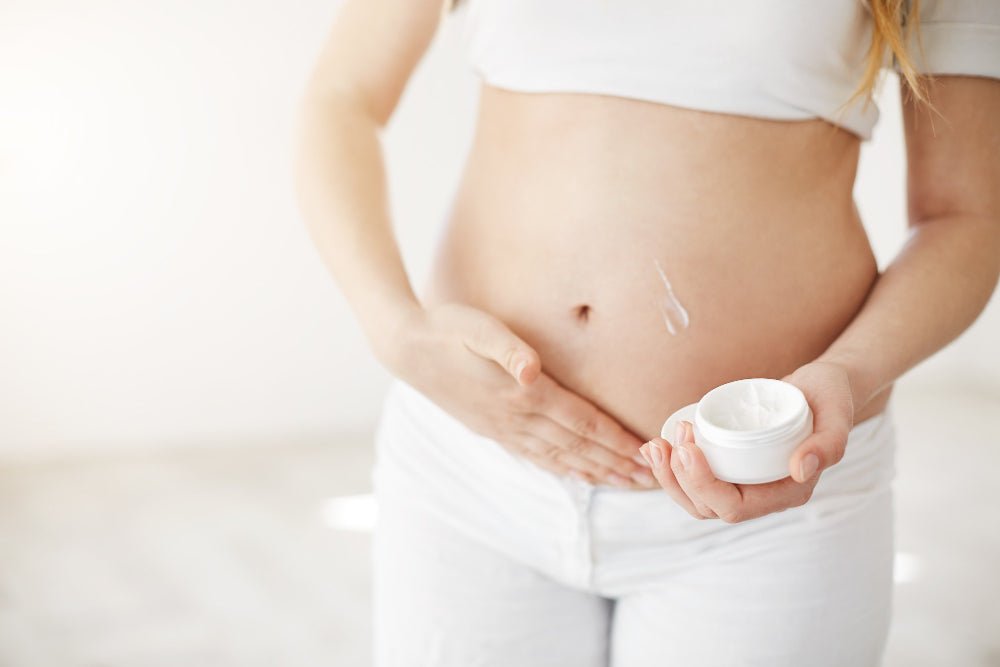Safe, Simple, and Sane Skincare for Future Moms - 1 of 3

Your skin is the most visible sign of your overall health and should be well cared for. Hormonal fluctuations may lead to various skin issues, and it's also crucial to be cautious about exposure to harmful toxins.
Up to 90% of pregnant women experience changes in their skin, such as acne, dark spots, and stretch marks. Hormones such as estrogen, progesterone, and hCG can have varying effects on the skin.These changes are often temporary but can be distressing for many women
For future moms, the moment they find out about their pregnancy marks the beginning of an incredible journey full of happiness and expectation. However, like all changes, it is accompanied by uncertainties and unexpected occurrences. Getting ready beforehand can provide a sense of control and ultimately lead to a more positive experience.
Numerous things require your consideration, and while your skin's condition may not seem of great importance, it is the most visible sign of your overall health and thus, should be well cared for. Hormonal fluctuations may lead to various skin issues, and it's also crucial to be cautious about exposure to harmful toxins that could affect your baby's development. In this piece, we share some pregnancy skincare tips to assist prospective mothers in maintaining the best care throughout this period.
Knowing what to expect brings peace of mind
Up to 90% of pregnant women experience changes in their skin, such as acne, dark spots, and stretch marks. Hormones such as estrogen, progesterone, and hCG can have varying effects on the skin.These changes are often temporary but can be distressing for many women. Understanding what these are and how they present themselves on your skin can alleviate any potential worries:
Increased Pigmentation: Higher estrogen levels can trigger melanin production, resulting in hyperpigmentation areas like the nipples, areolas, and a dark abdominal line called linea nigra becoming darker. Melasma, also termed the "pregnancy mask," is another prevalent pigmentation alteration marked by dark facial patches.
Stretch Marks: The skin is forced to stretch as the body enlarges to accommodate the burgeoning fetus. Elevated cortisol levels combined with hormonal fluctuations can diminish the skin's elasticity, resulting in the development of stretch marks.
Acne and Oiliness: During pregnancy, some people have more progesterone, a hormone that makes skin oily and hair follicles smaller. This can cause acne, especially Acne vulgaris.
Changes in Hair Growth: During pregnancy, some women may have thicker hair because they are shedding less. Others might notice more hair growing in places they don't want, like the face or abdomen, because of androgen hormones. [2]
Increased Blood Flow: When you're pregnant, hormones can make more blood flow to your skin, making you look like you have a "pregnancy glow." But this can also make skin conditions like rosacea or spider veins worse. [4]
Skin Sensitivity: Changes in hormones can amplify reactions to skincare products, exposure to the sun, or irritants in the environment.
Changes in Texture: Some expectant moms might observe alterations in their skin's texture, like getting drier or softer, which can also be linked to hormone fluctuations and shifts in hydration levels.
There is no quick fix for them, so embrace them as part of the journey as well as reminders to take a good care of yourself: drink plenty of water, eat a balanced diet, manage stress, and stick with a simple, healthy, and effective pre-natal skincare routine.
